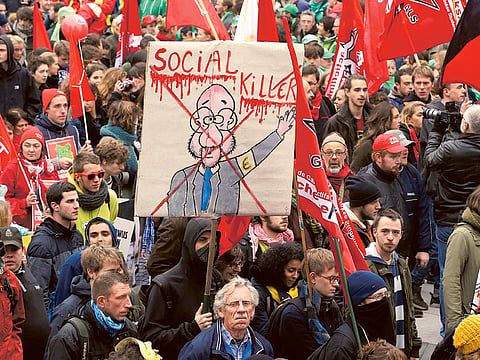Belgium faces first mass protest against new government
March is the first in a series of rallies and strikes against economic and social reforms

Brussels: Tens of thousands of Belgians gathered for a huge march through the capital Brussels Thursday in the first mass protest against the new centre-right government’s austerity policies.
The march is the first in a series of rallies and strikes against economic and social reforms announced by Prime Minister Charles Michel, a French-speaking liberal who heads an unprecedented centre-right coalition that includes Flemish nationalists.
Protesters waved flares and held banners as they massed for the start of the march, while there was disruption to subway trains, trams and buses throughout the capital, where the European Union is based.
Police said they expected as many as 80,000 demonstrators while the unions hope more than 100,000 protesters will show up. Rail companies said they have already sold more than 80,000 low-cost tickets to encourage people to attend the demonstration.
Workers and staff at steel firms, the ports of Antwerp and Zeebrugge, the post office and in education are also planning to stage a work slowdown.
“The whole raft of government measures create a potentially explosive cocktail,” Marie-Helene Ska, secretary general of the leading Belgian union, CSC, warned in the newspaper Le Soir.
The unions as well as the socialist, green and extreme left parties oppose a decision to scrap plans for the usual automatic cost-of-living raises next year.
They also reject plans to raise the retirement age from 65 to 66 from 2025 and to 67 in 2030.
The new government is also aiming to impose cost-cutting measures on the civil service as well as in the fields of culture and scientific research.
“We have made an agreement on a government and an agreement on a budget which will balance Belgium’s books by 2018,” the 38-year-old Michel said last month after the coalition was formed.
The coalition groups three Flemish parties — the nationalist New Flemish Alliance, the Christian Democrat CD & V and the liberal Open VLD — and Michel’s French-speaking liberals.
The new government is likely to face the same problems as before, most notably the unavoidable division between Belgium’s Flemish-speaking north, which tends to be more conservative, and a French-speaking, more liberal south.
Over the years, greater powers have been devolved to the regions to ease communal tensions, with separate governments elected in Flanders, Wallonia and for the bilingual Brussels capital region.
Major strikes are expected in the Belgian provinces over the next few weeks before a general strike is held throughout the kingdom on December 15.
The last large nationwide demonstrations against austerity were held in February 2013 attracted up to 40,000 people.
Sign up for the Daily Briefing
Get the latest news and updates straight to your inbox



